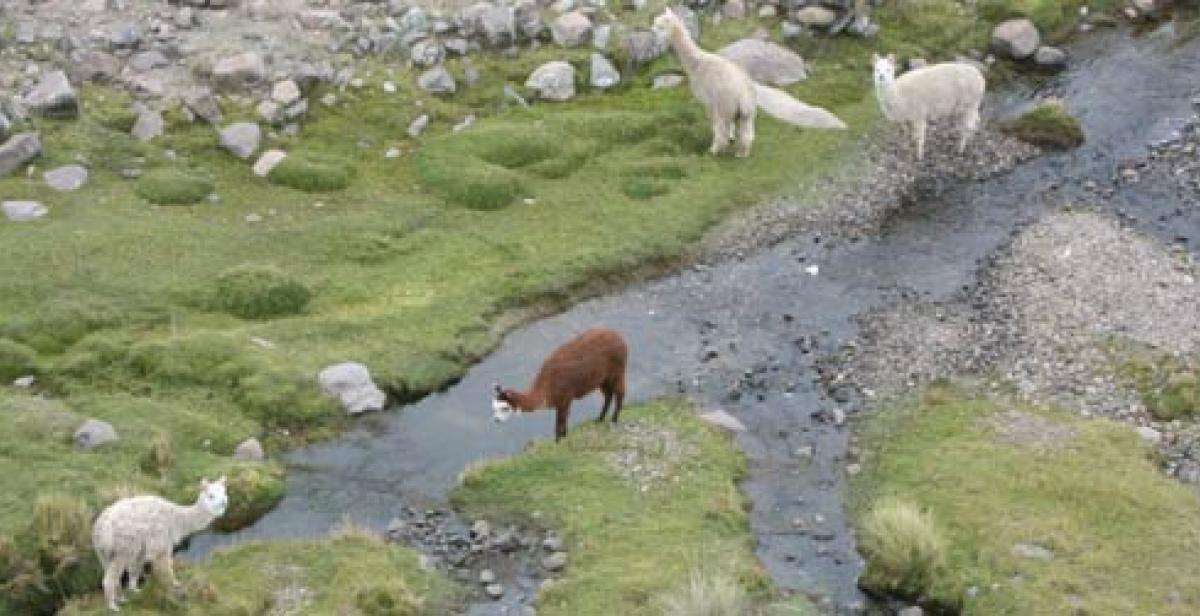On my last trip to Huancavelica, Humberto Lizana, a livestock farmer, told me: “10 years ago no one would talk about water and how to make good use of it. No one was interested.”
Nowadays things are different. “Many communities are aware of the fact that they have to use and manage their water in a sustainable way and that they have to protect their natural resources from the interests of the state and private sector,” he told me.
The community of Alpaca breeders in Carhuancho in Huancavelica, for instance, has been fighting to have access to and protect the water on their own territory – water which is being redirected towards the Peruvian coast in Ica for large scale agriculture. They have resorted to the Latin American Water Tribunal (LAWT) to seek justice.
The Drop by Drop report by Progressio, CEPES and Water Witness International demonstrates the extent of the problem. It shows how unsustainable agricultural expansion in Ica increases water demand and – because this demand is being met by redirecting water from Huancavelica – has a significant impact on the lives of small and medium-scale farmers in Huancavelica.
Although people in the Andes have always been faced with climatic extremes, in the last few years the rains, cold temperatures, droughts and floods have intensified and are directly affecting the lives of the most impoverished and marginalised population in the rural sector. The unavailability of water for domestic and agricultural uses is a main concern of the rural population.
Meanwhile, the agricultural frontier is rapidly expanding, with a government that encourages private investment without taking into account the impacts of these projects on the natural environment. Most of these projects are located in coastal areas where water resources are scarce, but the government has given big companies priority over access to water – and at a price that does not reflect the need for water in Peru. The state does not always assure compliance with the Environmental Impact Assessments or apply the necessary sanctions.
No wonder the local farmer organisations, representatives of the water user boards, rural community members and indigenous populations cannot simply trust the government, or rely on the good intentions of the big companies, on the laws of the market or the newly signed trade agreements.
Instead they have their own priorities, agendas and proposals they wish to share. For example, they insist upon the necessity for the state to carry out the Environmental Impact Assessments. Many grassroots organisations consider it is necessary to create an International Tribunal for the Rights of Nature because it is difficult to rely upon the good intentions of the state, and in many cases difficult for grassroots organisations to speak out on these issues and have an impact at the national level.
During my last visit to Huancavelica, I had the opportunity to work with local community leaders who are making great efforts to protect the natural resources that surround them and that they depend upon. But as Humberto Lizana emphasises, “There is still a lot to be done.” He says NGOs are helping to bring irrigation systems to the communities, but there is a real need for more research, in order to understand the problems in their wider context and find the best ways to adapt and avoid – as much as we can – the inevitable water scarcities to come.
Cindy Krose is a Progressio development worker in Peru. She works with our partner organisation CEPES. In Huancavelica, CEPES works with communities to find ways to deal with water scarcity and adapt to climate change.
Photo: Alpaca grazing beside a stream in Huancavelica, Peru (photo © Nick Hepworth/Water Witness International/Progressio).




Comments
what are the causes of water
what are the causes of water scarcity here in peru?